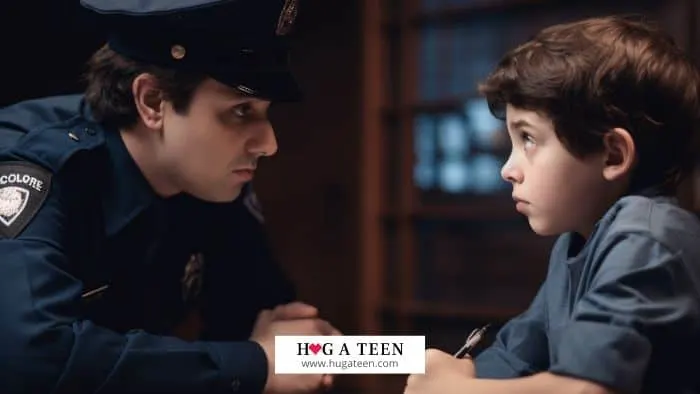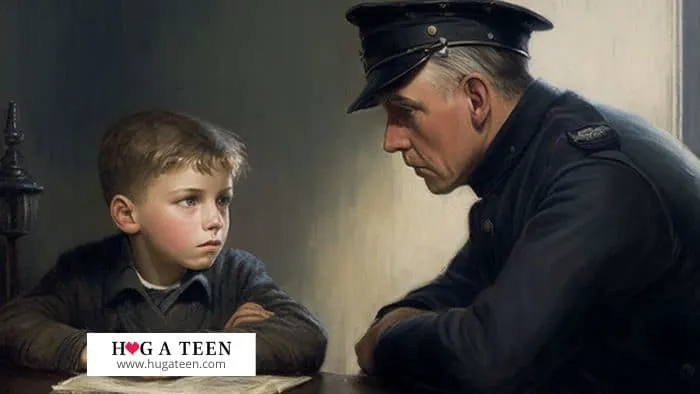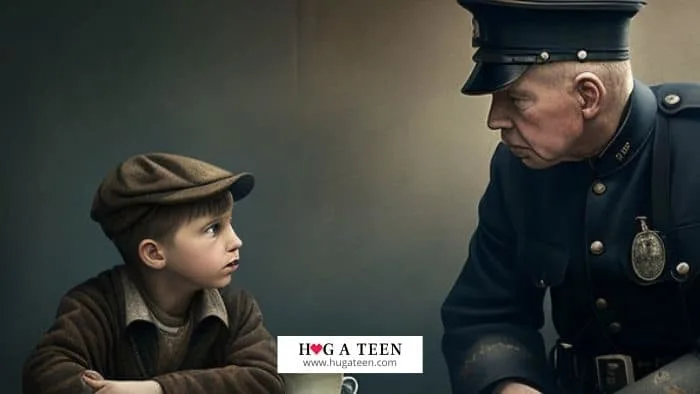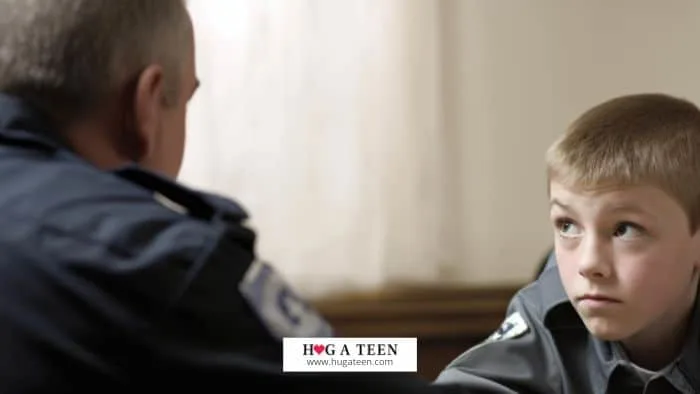The complex issue of law enforcement officers questioning a minor without parental consent presents several challenges. This article delves into this sensitive matter, encompassing juvenile rights, police protocols, and the role of criminal defense attorneys in protecting the rights of the child involved.
- Can A Police Officer Question A Minor Without Parental Consent?
- What Age Is A Minor In USA?
- Juvenile vs Minor
- What Rights Do Juveniles Have?
- Do Juveniles Have Miranda Rights?
- The Fifth And Sixth Amendments
- Rights When A Minor Is A Victim Or A Witness
- Rights When A Minor Is A Suspect
- Do Minors Have To Talk To The Police?
- What Is The Best Way For A Minor To Avoid Police Questioning?
- Rights Without Parents Present
- Can You Drug Test A Minor Without Parental Consent?
- Is It Illegal To Record A Minor Without Consent?
- Can A School Search A Minor Without Parental Consent?
- Are Schools Allowed To Question Minors Without A Parent?
- Can Police Search A Minor Without Parental Consent?
- Arrest And Questioning Procedures For Juveniles
- What To Do If Police Call You In For Questioning?
- Can Police Interrogate You Without A Lawyer?
- Can Police Question You After You Ask For A Lawyer?
- Can You Refuse A Police Interview?
- Final Thoughts
Can A Police Officer Question A Minor Without Parental Consent?
Indeed, law enforcement officials may question a minor without parental consent. However, for the confession or evidence acquired to be deemed admissible in court, it must meet certain requirements to prove that the voluntary statements made by the child did not stem from coercive police questioning.
Even though a police officer may question a juvenile, the child has the right to remain silent, and to ask for a parent or lawyer to be present. It is therefore up to the child to know, ask for, or waive their rights.

What Age Is A Minor In USA?
A minor, in the context of criminal activity and juvenile justice in the USA, is generally anyone under the age of 18. However, the age could fluctuate in different states based on specific legal stipulations.
Juvenile vs Minor
The terms “juvenile” and “minor” are often used interchangeably in everyday language, but they can carry different connotations in the legal context. A “minor” generally refers to a person under the age of 18. A “juvenile,” on the other hand, typically denotes a minor who is involved in the criminal justice system.
When it comes to questioning by police without parents present, the rules can apply similarly to both juveniles and minors, as both groups are under the age of 18 and thus receive additional protections under the law.
However, there are some variations based on the circumstances of the interaction with law enforcement and the specific laws of the jurisdiction. For instance, when dealing with juveniles (minors involved with the criminal justice system), the police are often required to take extra precautions. This can include ensuring that the juvenile fully understands their rights and the consequences of waiving those rights, which might involve having a parent or guardian, or an attorney, present for questioning.
It’s also important to note that the rules about when a parent must be present for police questioning can vary widely by jurisdiction, so the local law should always be consulted for specific situations. But in general, both minors and juveniles have the right to have a parent, guardian, or attorney present during police questioning, and this right becomes particularly important if the child is in custody or otherwise not free to leave the questioning.
What Rights Do Juveniles Have?
Juveniles, like adults, are accorded specific constitutional rights under the process of law. They have the right to a defense by a juvenile defense lawyer, the right to remain silent, protecting them from providing an incriminating statement, and protection from unreasonable searches and seizures.
The Right To Remain Silent
The right to remain silent is an essential constitutional right that applies to individuals of all ages, including minors, who are being questioned by the police. This right ensures that individuals have the protection against self-incrimination and allows them to exercise their Fifth Amendment privilege.
For minors being questioned by the police, it is important to know that they have the right to refuse to answer any questions. They cannot be forced or coerced into providing any information that may potentially incriminate them or be used against them in a criminal matter. This right to remain silent extends to all stages of police questioning, whether it takes place in a custodial setting such as a police station, or in a non-custodial setting such as at school.
📢 Suggested reading: Controversial Topics For Teenagers
Right to Parental Presence during Interrogation
The right to parental presence during interrogation is crucial when minors are questioned by the police. Without the presence of a parent or legal guardian, a minor may be at a significant disadvantage in understanding their rights and the potential implications of the questions being asked.
First and foremost, having a parent present provides emotional support and reassurance to the minor, who may already be overwhelmed and scared by the situation. A parent can help alleviate the anxiety and stress that can come with being questioned by law enforcement officers.
Furthermore, parents play an essential role in ensuring that their child’s rights are protected. They can help the minor understand the nature of the questioning, the potential consequences of their answers, and the importance of having legal representation. A parent can also serve as a witness to the interrogation, ensuring that it is conducted in a fair and respectful manner.
The absence of parental presence during interrogation can have serious implications for minors. They may be more susceptible to coercion or manipulation by law enforcement, leading to potential incriminating statements that may be used against them. Without parental guidance, the minor may unknowingly waive their rights or answer questions that could be self-incriminating.
One such example is the Brendan Dassey case where “Dassey’s attorneys have since asked for him to be released, or given another trial, on the basis that his constitutional rights were violated due to ineffective assistance of counsel and an involuntary confession.” – Fox6
Right To Legal Representation
In cases where police officers question minors without parental consent, legal representation plays a crucial role in protecting the rights of these individuals during the interrogation process. Minors, just like adults, have constitutional rights that need to be upheld, and having legal representation ensures these rights are safeguarded.
When a minor is questioned by law enforcement officers without their parents present, a juvenile defense lawyer or criminal defense attorney can provide invaluable guidance and support. These legal professionals specialize in representing minors and understand the unique challenges that arise in these situations.
A juvenile defense lawyer can help the minor understand their rights and the implications of the questions being asked. They can also advise the minor on whether or not to answer certain questions and how to best protect themselves legally. Additionally, a defense attorney can advocate for the minor, ensuring that their rights are respected and that they are treated fairly throughout the entire interrogation process.
📢 Suggested reading: Can Parents See Your Search History?
Do Juveniles Have Miranda Rights?
Absolutely, juveniles do possess Miranda rights. Law enforcement agencies are legally required to apprise them of these rights prior to any custodial setting interrogation.
The Fifth And Sixth Amendments
The Fifth Amendment safeguards a child in custody against self-incrimination. The Sixth Amendment, on the other hand, guarantees the right to a swift trial, an unbiased jury, and defense from a criminal defense attorney.

Rights When A Minor Is A Victim Or A Witness
When a minor is a victim or a witness to a crime, they have rights to privacy and to be accompanied by a parent or guardian during questioning. Moreover, they have the right to avail support from victim services, including a child witness program if available.
Rights When A Minor Is A Suspect
When implicated in criminal matters, minor suspects possess several rights, including protection from self-incrimination, the right to representation from juvenile defense attorneys, and the right to have a parental presence during questioning.
However, even though they have several rights, police also have rights, so it’s up to your child to know their rights to remain silent and have parents or lawyers present and that if they make this request and police don’t comply, then that could put the police and the case against the child in jeopardy.
For example, in Nevada, the police can question children of any age (whether they are 17 or 10 years old) without informing their parents or asking whether they want a parent present.
It is therefore up to the juvenile to demand their rights (right to remain silent, right to have a parent present, right to legal representation.)
Do Minors Have To Talk To The Police?
No, minors, like adults, can exercise their right to remain silent, a fundamental aspect of their civil rights. They also have the right to request the presence of a criminal defense lawyer during questioning.
What Is The Best Way For A Minor To Avoid Police Questioning?
The best approach for a minor to evade police questioning is to courteously invoke their right to remain silent and request the assistance of a juvenile lawyer.
📢 Suggested reading: What Happens If You Run Away From Home At 16?
Rights Without Parents Present

Can You Drug Test A Minor Without Parental Consent?
Typically, any medical procedure, including a drug test, requires parental consent for minors. However, in extraordinary circumstances, such as certain legal proceedings or when the child poses an imminent threat, the rule may be bypassed.
Is It Illegal To Record A Minor Without Consent?
Yes, generally, it is illegal to record a minor without consent. The specific legality depends on state law and the context of the recording. Recording a minor without consent can lead to a violation lawsuit.
Can A School Search A Minor Without Parental Consent?
School officials have the authority to conduct searches on school grounds during school hours without parental consent under certain circumstances. This is based on the “reasonable suspicion” rule.
📢 Suggested reading: Can Dentists Tell If You Vape & Will They Tell Your Parents?
Are Schools Allowed To Question Minors Without A Parent?
Yes, school staff members can question minors without a parent being present as part of their duties to maintain discipline or ensure safety on the school campus.
Can Police Search A Minor Without Parental Consent?
Law enforcement officers can search a minor without parental consent if they have probable cause to suspect the minor’s involvement in a crime or if the minor gives voluntary consent to the search.
Arrest And Questioning Procedures For Juveniles
Law enforcement agencies must adhere to specific protocols when arresting and questioning juveniles. These include reading Miranda rights, notifying parents or guardians, and ensuring the presence of a juvenile defense lawyer.

What To Do If Police Call You In For Questioning?
When called in for questioning, it is advised that one contacts a juvenile defense attorney to avoid the risk of making involuntary statements. The right to remain silent is paramount in these scenarios to avoid self-incrimination.
Can Police Interrogate You Without A Lawyer?
Law enforcement officials can initiate an interrogation without a lawyer present, but you have the right to halt the questioning until your lawyer arrives. It is a legal requirement and a critical constitutional rule.
Can Police Question You After You Ask For A Lawyer?
After a request for a lawyer, police are legally bound to stop questioning until the lawyer is present. Any violation of this rule can lead to the confession being rendered inadmissible.
Can You Refuse A Police Interview?
Yes, a person can refuse a police interview. It’s always recommended to have legal representation from criminal defense lawyers before engaging in such interactions with law enforcement. Keep in mind that while you have the right to refuse a police interview, this doesn’t mean you can leave if you’re under arrest. It simply means you don’t have to answer questions without a lawyer present.
Final Thoughts
Navigating the complex terrain of minor child questioning and police custody is a delicate matter. Law enforcement’s duty involves the precarious balance of investigating potential crime and respecting the rights of minors. The juvenile crimes landscape is fraught with instances of voluntary confession and charges that hinge on the fine line between custodial interrogation and informal questioning.
Minors can be called into the police station or even a juvenile processing office for questioning about their involvement in potential criminal activity. This could be a challenging time for both the minor and the parents, especially when occurring at school without parents’ presence. Every interaction with authority figures, such as school personnel or law enforcement officials, holds profound implications for children, and there is a need for extra protection in these situations.
The 14-year-old high school student found with a gun at school or a child under arrest, their images splashed across police reports and media outlets, are stark reminders of juvenile delinquency issues in our society. They highlight the urgent need for legal protections and, in some cases, juvenile criminal defense.
Our Supreme Court’s decisions underscore that a minor child’s rights do not recede at the police department’s doorstep. In the United States, juvenile courts uphold these constitutional protections, balancing the child’s age and maturity level with the seriousness of the alleged violation. Whether it’s a custodial setting or a non-custodial one such as a video conference from the child’s home, these rights remain paramount.
Children, just like adults, are entitled to the 6th amendment rights, including the right to a criminal defense consultation. This is a key issue as it can substantially alter the outcomes of cases, especially where there’s an absence of evidence or the evidence presented by the police is contested.
Parents also have rights during these moments. They have the right to be informed about their child’s arrest, to be present during questioning, and to secure the services of criminal defense lawyers to safeguard their child’s interests.
In conclusion, it is essential to consult with a juvenile criminal defense lawyer if your child is drawn into a criminal matter, as they can guide you through these common circumstances. This is a serious situation that warrants a proactive approach, and contacting criminal defense lawyers today should be the first step taken. Understanding and protecting your child’s rights, especially when they are in jeopardy, should always be the priority.
